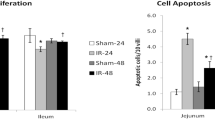Abstract
Maintenance of gut mucosal homeostasis depends on a balance between cell proliferation and cell death. Gut mucosal integrity is impaired after severe burn and during starvation. We determined the effect of burn, starvation, and the combination of both on small bowel epithelial apoptosis and proliferation. Fifty adult male Fischer 344 rats (260–300 g) received a 60% full-thickness scald burn and were randomly divided into fed and starved groups. Small intestine was taken at 12, 24, and 48 hr after injury. All animals in the 12-hr group were starved while recovering from anesthesia. Apoptosis was quantified by immunohistochemical staining (TUNEL) and mucosal proliferation was determined by bromodeoxyuridine (BrdU) incorporation. The apoptotic index was higher in burned rats compared to controls at 12 hr after burn; both these groups were starved (P < 0.05). At 24 and 48 hr after burn, apoptosis was highest in the starved groups, with no additional effects of burn (P < 0.05). Mucosal epithelial cell proliferation was not different between groups at any time point. In conclusion, burn and starvation both increase apoptosis in the small bowel mucosa; however, these effects are not additive. Apoptosis could be attenuated by enteral feeding, which delineates the importance of early enteral feeding initiation after injury to maintain mucosal integrity.
Similar content being viewed by others
REFERENCES
Steller H: Mechanisms and genes of cellular suicide. Science 267:1445-1449, 1995
Wolf SE, Ikeda H, Matin S, DebRoy MA, Rajaraman S, Herndon DN, Thompson JC: Cutaneous burn increases apoptosis in the gut epithelium of mice. J Am Coll Surg 188:10-16, 1999
Chung DH, Evers BM, Townsend CM Jr, Huang KF, Shimoda I, Herndon DN, Thompson JC: Burn-induced transcriptional regulation of small intestinal ornithine decarboxylase. Am J Surg 163:157-163, 1992
Sun Z, Wang X, Deng X, Lasson A, Wallen R, Hallberg E, Andersson R: The influence of intestinal ischemia and reperfusion on bidirectional intestinal barrier permeability, cellular membrane integrity, proteinase inhibitors, and cell death in rats. Shock 10:203-212, 1998
Sun Z, Wang X, Wallen R, Deng X, Du X, Hallberg E, Andersson R: The influence of apoptosis on intestinal barrier integrity in rats. Scand J Gastroenterol 33:415-422, 1998
Holt PR, Moss SF, Heydari AR, Richardson A: Diet restriction increases apoptosis in the gut of aging rats. J Gerontol A Biol Sci Med Sci 53:B168-B172, 1998
Noda T, Iwakiri R, Fujimoto R, Matsuo S, Aw TY: Programmed cell death induced by ischemia-reperfusion in rat intestinal mucosa. Am J Physiol 274:G270-G276, 1998
Elmes ME: Apoptosis in the small intestine of zinc-deficient and fasted rats. J Pathol 123:219-223, 1977
Magnotti LJ, Upperman JS, Xu DZ, Lu Q, Deitch EA: Gut-derived mesenteric lymph but not portal blood increases endothelial cell permeability and promotes lung injury after hemorrhagic shock. Ann Surg 228:518-527, 1998
Herndon DN, Wilmore DW, Mason AD Jr, Pruitt BA Jr: Development and analysis of a small animal model simulating the human postburn hypermetabolic response. J Surg Res 25:394-403, 1978
Jarrar D, Wolf SE, Jeschke MG, Ramirez RJ, DebRoy M, Ogle CK, Papaconstantinou J, Herndon DN: Growth hormone attenuates the acute phase response to thermal injury. Arch Surg 132:1171-1176, 1997
Jeschke MG, Wolf SE, DebRoy MA, Jarrar D, Arai Y, Herndon DN: Recombinant human growth hormone downregulates hepatocyte growth factor in burns. J Surg Res 76:11-16, 1998
Jeschke MG, Herndon DN, Wolf SE, DebRoy MA, Rai J, Lichtenbelt BJ, Barrow RE: Recombinant human growth hormone alters acute phase reactant proteins, cytokine expression, and liver morphology in burned rats. J Surg Res 83:122-129, 1999
Jeschke MG, Chrysopoulo MT, Herndon DN, Wolf SE: Increased expression of insulin-like growth factor-I in serum and liver after recombinant human growth hormone administration in thermally injured rats. J Surg Res 85:171-177, 1999
Inoue Y, Grant JP, Snyder PJ: Effect of glutamine supplemented total parenteral nutrition on recovery of the small intestine after starvation atrophy. JPEN 17:165-170, 1993
Carter EA, Hatz RA, Yarmush ML, Tompkins RG: Injury induced inhibition of small intestinal protein and nucleic acid synthesis. Gastroenterology 98:1445-1451, 1990
Ikeda H, Suzuki Y, Suzuki M, Koike M, Tamura T, Tong J, Nomura M, Itoh G: Apoptosis is a major mode of cell death caused by ischaemia and ischaemia/reperfusion injury to the rat intestinal epithelium. Gut 42:530-537, 1998
Baron P, Traber LD, Traber DL, Nguyen T, Hollyoak M, Heggers JP, Herndon DN: Gut failure and translocation following burn and sepsis. J Surg Res 57:197-204, 1994
Ryan CM, Yarmush ML, Burke JF, Tompkins RG: Increased gut permeability early after burns correlates to the extent of burn injury. Crit Care Med 20:1508-1512, 1992
Messick WJ, Koruda M, Meyer A, Zimmerman K: Differential changes in the intestinal permeability following burn injury. J Trauma 36:306-312, 1994
Huang KF, Chung DH, Herndon DN: Insulin-like growth factor-I (IGF-I) reduces gut atrophy and bacterial translocation after severe burn injury. Arch Surg 128:47-54, 1993
Zapata-Sirvent RL, Hansbrough JF, Greenleaf GE: Reduction of bacterial translocation and intestinal structural alterations by heparin in a murine burn injury model. J Trauma 36:1-6, 1994
Author information
Authors and Affiliations
Rights and permissions
About this article
Cite this article
Jeschke, M.G., Debroy, M.A., Wolf, S.E. et al. Burn and Starvation Increase Programmed Cell Death in Small Bowel Epithelial Cells. Dig Dis Sci 45, 415–420 (2000). https://doi.org/10.1023/A:1005445501016
Issue Date:
DOI: https://doi.org/10.1023/A:1005445501016




